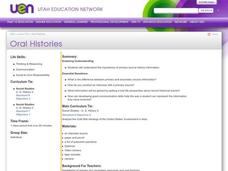National Endowment for the Humanities
The Question of an American Empire
As it rose to being the new super power, America had a choice: conquer other nations like its European predecessors, or stay home. Using primary source documents from those thinking about American foreign policy in the late 1800s,...
National Endowment for the Humanities
The Mexican Revolution
The legacies of the Mexican Revolution are visible today—even if some history classes don't cover them. Using primary sources from leaders in Mexico at the time of the popular uprising and other evidence, such as railroad maps, young...
National Woman's History Museum
Unsung Voices: Black Women and Their Role in Women's Suffrage
Reclaim perspectives often left out of the narrative about the suffrage movement with an activity that lifts up the voices of African American women. Using primary sources and biographical details of Fannie Barrier Williams' life, young...
K20 LEARN
Whose Manifest Destiny? Westward Expansion
Your land is my land! Young historians investigate the concept of Manifest Destiny used by the United States government to justify western expansion. Jigsaw groups read primary source documents to gain an understanding of the movement...
Benjamin Franklin Tercentenary
Franklin, Master Diplomat
While many often associate Ben Franklin with his kite electricity experiments, budding historians find out he contributed much more. They discover Franklin's political savvy by examining primary sources in the informative installment of...
Middle Level Learning
Philip Reid and the Statue of Freedom
Approach the concept of freedom in United States history from a variety of angles and delve into rich primary source analysis practice. Pupils study the Statue of Freedom, which sits atop the dome of the Capitol building in Washington...
Elizabeth Murray Project
Gender and Opportunity in Colonial America
What was life like for women in Colonial America? What restrictions were placed upon them and what opportunities were they afforded? A case study of Elizabeth Murray offers high schoolers a chance to investigate primary source documents...
National Constitution Center
Federalism, the Commerce Clause, and the Tenth Amendment
How do the state and federal governments relate to each other? The Constitution has a lot to say about that! Using an interactive online tool, pupils explore the Tenth Amendment. They apply their knowledge to political cartoons and news...
National Endowment for the Humanities
Lesson 3: Britain, Napoleon, and the American Embargo, 1803–1808
While the French were once the allies of Americans, the Napoleonic Wars saw the United States almost drawn into a war with its one-time friend. Wars in Europe threatened to draw in the early republic. A primary source-based activity...
National Endowment for the Humanities
Lesson 2: The United States, France, and the Problem of Neutrality, 1796–1801
While the French Revolution could be considered inspired by the American Revolution, it created thorny problems for the new United States. Should the United States get involved and be drawn into a European drama? Was the US strong...
National Endowment for the Humanities
Lesson 1: The United States Confronts Great Britain, 1793–1796
After the Revolutionary War, the success of the United States was far from guaranteed. Foreign powers coveted the new land, and Great Britain challenged American sovereignty. Learners consider the challenges facing the new nation using...
National Woman's History Museum
Eleanor Roosevelt: An Agent of Social Change
First ladies often take a back seat to their husbands' policies, but Eleanor Roosevelt broke that mold. Interested historians examine primary sources written by Roosevelt, including a speech and articles. Completing a round-robin of...
PBS
Primary Sources
Students see how to use primary and secondary sources to investigate history. Whether it is a photograph, book, map, letter, postcard, newspaper, or official document, students can use sources to reconstruct and relive history.
Curated OER
Oral Histories
Distinguish the difference between primary and secondary sources. High schoolers discover how to conduct an interview using an individual as a primary source, and why it is important to get a real-life perspective. They either video or...
Curated OER
Lesson 8: Prithee, Pause!
High school learners examine primary source materials on history and the supernatural which relate to Julius Caesar. They then act out a scene based on different historical understandings and identify facts, theories, and similarities in...
Curated OER
A Lesson To Accompany "The First Bank of the United States: A Chapter in the History of Central Banking"
Here is an interesting topic. Learners examine the economics that led to the founding of the First Bank of America. They participate in a reader's theater experience depicting the debate between Alexander Hamilton and Thomas Jefferson...
Curated OER
William Apess and the Mashpee "Revolt" of 1833
Prompt your class with the following question: What was the status of American Indians in Massachusetts during Jackson's presidency? To answer this question, class members will read a series of primary source documents (attached),...
Curated OER
Whose History Is It Anyway? Patterns in History
Read and examine primary source material in order to analyze, synthesize, and debate information about the Great Depression. Critical analysts research various source materials related to the Great Depression. They work in teams to...
Ford's Theatre
How Perspective Shapes Understanding of History
The Boston Massacre may be an iconic event in American history, but perhaps the British soldiers had another point of view. Using primary sources, including reports from Boston newspapers and secondary sources from the British...
Curated OER
Create a Walking Tour of San Francisco's Chinatown
Take a tour of Chinatown as it was in the 1800's. Analyzing primary source images and documents, learners will gain a better understanding of the myths and misconceptions of Chinese immigrants during the 1800's. They create a pamphlet to...
Curated OER
1960 America: Foreign Policy
The 1960's marked shifts in American culture, politics, and policy. Your class groups up to research a series of primary source documents resulting in a timeline and a 15 minute oral presentation. Active learning all the way.
Curated OER
The New England Fishing Industry:Sea Changes in a Community
Explore New England's economic and cultural past and possible issues New Englanders will face in the future. Middle and high schoolers research the fishing industry and the need for regulation. They analyze the topography of New England...
Curated OER
Interpreting Foundation Documents of the American Republic
Explore early American documents that qualify as primary sources. Tenth and eleventh graders use the provided worksheets to analyze the texts of the Articles of Association, the Declaration of Independence, the Articles of Confederation,...
Curated OER
Forty Acres? The Question of Land at the War's End
Should land be redistributed to former slaves after the Civil War? This essential question guides a lesson on the Reconstruction Era, as learners analyze primary sources (linked), recording responses on a worksheet (linked). To model the...
Other popular searches
- Using Primary Sources
- Wwi, Primary Sources
- Rosa Parks Primary Documents
- Gilded Age Primary Sources
- Working With Primary Sources
- Primary Resources Hsie
- Web Quests Primary Sources
- Ancient Rome Primary Sources
- 1920 1929 Primary Sources
- Primary Sources and Family
- Conscription Primary Sources
- Scotland Primary Sources

























